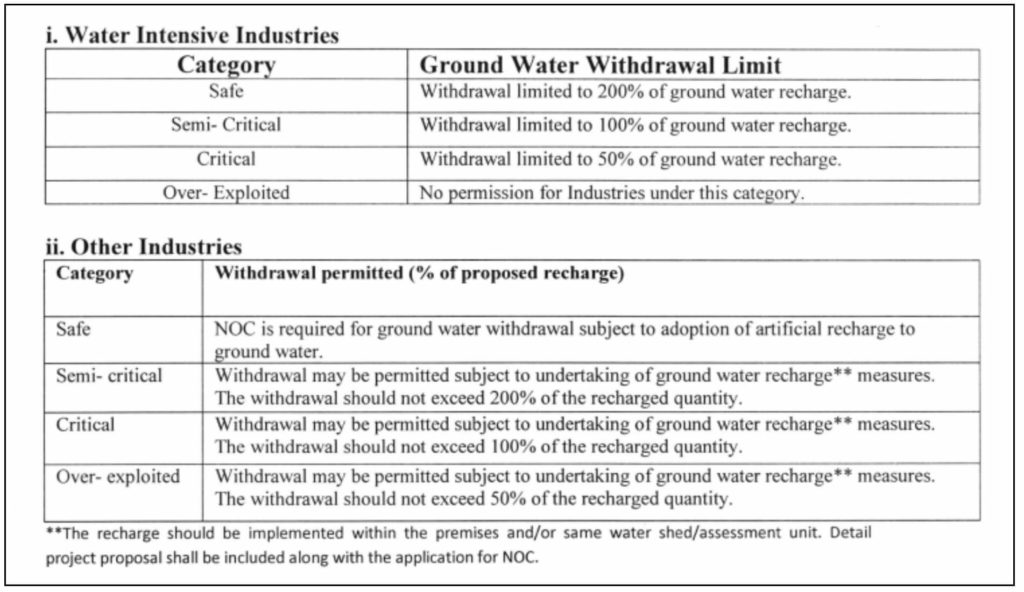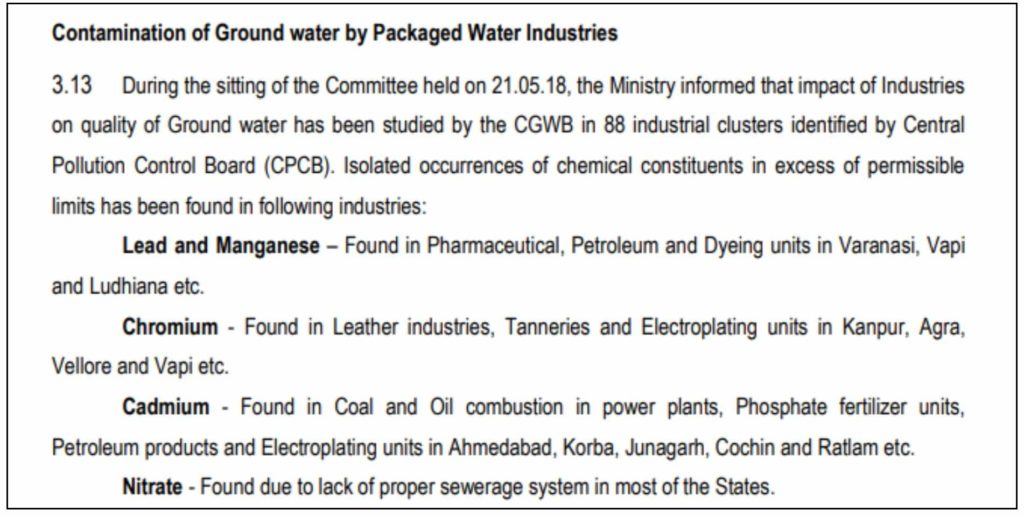Providing access to safe drinking water has been on the agenda of every government for last few decades. India’s water crisis is not new and with rapid urbanization, this problem is only going to get worse. Here is a two-part review of the parliamentary standing committee report that looked at commercial exploitation of water.
Water, the elixir of life, is becoming a scarce resource due to varied reasons. It was observed in one of our earlier stories that India was staring at a looming water crisis, both in terms of water availability and water quality. Water pollution and indiscriminate commercial exploitation of water resources have only exacerbated the situation.
The Standing Committee on Water Resources, River Development and Ganga Rejuvenation submitted its report ‘Socio-economic impact of commercial exploitation of water by industries’ in August 2018. The report had sixteen findings and recommendations to tackle the problems resulting from the exploitation of water resources by industries for commercial purposes. An Action Taken Report was laid in the parliament in March 2020. In a two-part story, these 16 recommendations and actions taken will be discussed.
Demand for Water is on the rise while the availability has dropped over the years
Issue: The demand for safe drinking water is on the rise with increasing population, industrialization and urbanization. This has resulted in significant socio-economic effects and environmental damage such as decline in ground water levels, deterioration in water quality, conflicts, etc.
Recommendation: A proper policy framework to address the socio-economic effects emerging out of indiscriminate exploitation of water resources for purely private commercial gains.
Action Taken: Central Ground Water Authority (CGWA) issues ‘No Objection Certificates’ to industries, mining projects and other infrastructural units laying out conditions and directions for ground water withdrawal. Ministry of Water Resources has revised guidelines for ground water abstraction which includes the provision for ‘Water Conservation Fee’ to be collected by states/UTs from industrial units against ground water usage, which can be used by the governments for efficient use of water resources.
Comments: The committee felt that there is no time frame mentioned for the implementation of the proposed measures. It was also observed that no separate policy is available for addressing the socio-economic consequences of ground water exploitation by private entities. Committee urged the Ministry of Jal Shakti to formulate a well-structured policy and enforcement mechanism immediately for better regulation of the commercial use of water.
Urban and Rural households are largely dependent on groundwater for potable water
Issue: 85% of rural drinking water schemes in 17.14 lakh habitations are based on ground water sources. Though 87% of rural households have access to basic water, provision of safe water is a challenge. As on 01 April 2018, a total of 78.14% Rural Habitations get more than 40 litres per capita per day Safe Drinking Water and 56.04% have access to Piped Water Supply.

Source: Standing committee report
Recommendation: Considering the rate of depletion of groundwater sources, surface water needs to be increasingly relied upon to meet the drinking water requirements in rural areas. Concerned authorities must take strict action against illegal drilling for handpumps. In areas affected with fluoride and arsenic contamination, packaged drinking water industries need to be roped in through incentives, to provide safe and clean drinking water.
Action taken: Ministry of Drinking Water and Sanitation encourages states to work on single village based piped water supply schemes that require only a small operation and maintenance cost. Under National Aquifer Mapping and Management program, Central Ground Water Board (CGWB) extends technical support to states to design wells free from arsenic contamination.
Comments: The committee felt that the Ministry of Jal Shakti now has a greater role in the management of water resources in India. It also observed that no response was provided to other queries of the committee such as emphasis on surface water in rural areas, measures taken to curb illegal drilling, and setting up of purification plants. Committee reiterated the need to promote packaged drinking water industries in areas severely affected with Arsenic and Fluoride contamination.
By 2021, groundwater table in 21 prominent cities including Delhi, Bengaluru and Hyderabad is expected to reach Zero Level, affecting access for 100 million people
Issue: In urban areas, 70.6% persons have access to tap water. Though 93% of urban population has access to basic water, according to NITI Aayog, large inter and intra city inequalities exist because of which dependence on privately extracted ground water has increased in most cities bringing down the groundwater level.
Recommendation: Ministry must take appropriate measures to reduce dependence on fresh water. Separate pipelines for recycled water and fresh water are required. Reduction in inter and intra city inequalities should be prioritized while providing water supply under AMRUT scheme.
Action taken: AMRUT scheme aims at universal water coverage in 500 cities. Some features of the scheme include rejuvenation of water bodies, augmentation of existing water supply, rehabilitation of old supply systems including treatment plants, groundwater recharge and recycle/reuse of wastewater.
Comments: The committee observed that no specific reply was furnished on steps taken to lay separate pipelines and bridging the inequalities within and across cities. The committee re-iterated its recommendation on bridging the gaps and laying out separate pipelines for fresh & recycled water.
Water withdrawal in some states is high
Issue: Despite the recharge obligations stipulated by CGWA for water withdrawal, in some states such as Andhra Pradesh, Gujarat, Tamil Nadu, and Karnataka where there are significant numbers of over-exploited areas, large number of licenses were being granted. Similarly, in semi critical and critical areas too, water withdrawal rate was high.

Source: CGWA Notice
Recommendation: Ministry must carry out an assessment on the total quantum of groundwater being used by packaged drinking water industries and the consequent impact on groundwater levels in areas where industries have come up in large scale.
Action Taken: The ministry stated that licenses for packaged drinking water is provided by FSSAI and so the details on groundwater used would be available with them. CGWA was involved in only granting NOCs. A ‘Water Conservation Fee’ that progressively increases from safe to over exploited areas and from low to high water consumption industries has been introduced.
Comments: The committee sought to know how CGWA grants NOCs without data on total quantity of groundwater extracted by industries. They also asked for details on any mandatory water audit carried out by industries. Committee reiterated the need for formulation of specific mechanism for assessing total groundwater extracted by these industries and its effect on groundwater level.
Encouraging PPP models of drinking water plants to ensure availability of safe water
Issue: Unanimously, all states admitted that the commercial companies did not contribute to water development or for public. Packaged drinking water plants supplement governments’ efforts to ensure availability of safe drinking water for the public.
Recommendation: The gap between demand and supply of potable water should be bridged largely by the government as a ‘topmost prioritized social responsibility’. Use of ground water as a raw material should be regulated by allowing only in exceptional cases as it is a scarce resource. To meet the demands of people, the government can encourage setting up of packaged water industries through PPP models.
Action Taken: National Water Policy, 2012 contains provisions to prevent groundwater depletion. A few provisions include adoption of improved technologies for water use, involvement of community in conservation, conduct of mandatory audits by industries extracting groundwater above a limit depending on area, etc.
Comments: The committee felt that the National Water Policy 2012 is not an effective measure to deal with the commercial exploitation of ground water for private gains without having to pay for the raw material. The mentioned measures might result in price escalation of packaged water affecting the consumers. A policy on commercial uses of Water both ground and surface, is the need of the hour.
Outdated legislations need to be updated
Issue: Groundwater is major source used by industries due to wide availability and private ownership.
Recommendation: The India Easement Act, 1882 which provides for right to extract groundwater should be amended at the earliest taking into consideration the present and future scenario of demand. Water (Prevention and Control of Pollution) Cess Act, 1977 which covers the levying and collection of cess on water consumed by industries should also be amended to reduce wastage of water.
Action Taken: To amend the India Easement Act, 1882, the suggestion has been submitted to the concerned ministry to take necessary action.
Issue: Different industries including tanneries, petroleum, pharmaceuticals, and fertilisers have contributed to the contamination of groundwater. Chloride and Nitrate are the most common ions found in excess, beyond permissible limit.

Source: Standing Committee report
Recommendation: Government should undertake a study on the impact of proliferation of packaged drinking water industries on groundwater quality.
Action Taken: CGWB has been instructed to conduct the study.
Featured Image: Measures to Conserve Water


